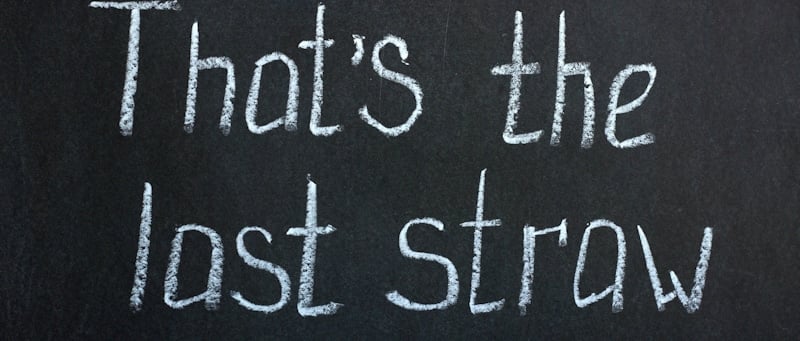Finding the right idiomatic expression to capture your thoughts can be challenging if you are not well versed with idiomatic expressions. The only way to be vast in idiomatic expressions is by studying them. This article aims to make you understand idioms.
The expression “the last straw” refers to the last event, activity, or incident that will happen to a person to make them completely frustrated and upset. When something happens after a series of unacceptable events, you can say it was the last straw.
The use of idiomatic expressions makes your writing exciting and interesting. However, you must have a comprehensive understanding of an idiomatic expression before using it.
What Does “The Last Straw” Mean?
Idiomatic expressions and proverbs are one of the beautiful parts of any language, and they infer a meaning that you may not be able to express or would not be easily expressed. It is not advisable to use idioms without understanding the meanings, and you will only create communication barriers.
This article will dive into the details by explaining the meaning, origin, and correct way to use the idiomatic expression “the last straw.” This will help you when you want to use the expression when writing so that the listener or reader can understand you better.
Now, we will start by discussing the meaning of the idiomatic expression “the last straw.”
The idiomatic expression “the last straw” means the last unpleasant event that makes you fed up, and you cannot experience and accept other unpleasant events anymore.
Another meaning of the idiomatic expression is the last tolerable situation that happens to you before you make up your mind not to accept such again. It also means the final setback in a series that causes something to stop working.
The idiomatic expression “the last straw” also means the final problem or source of irritation that causes one to lose patience and finally give up. It also refers to the final difficulty or burden that causes the collapse of everything.
It also refers to the final action of someone that calls for a reaction and response towards that person. The idiomatic expression “the last straw” also means the latest in a series of undesirable events that finally cause you to give up.

What Is The Origin Of The Idiomatic Expression “The Last Straw”?
There are many theories on how the idiomatic expression “the last straw” came to be and when it was first used, which we will be discussing.
There is said to be a story behind the origin of the idiomatic expression. The story tells us of the days when there was no modern transportation and a rich man who uses camels to transport straws. He was said to load the camel with lots of straws, but a day came when he was loading straws on a camel’s back, and as he put the last piece of straw, the camel collapsed.
The idiomatic expression “the last straw” is said to be the shortened form of the expression “the last straw that breaks the camel’s back,” The expression is said to have been used since the mid-1700s.
The idiomatic expression was used in an essay of 1724 where the emphasis was on the least cause, not the last.
A similar phrase developed in the 1800s is, “the last feather breaks the horse’s back.” However, the first example of the use of the expression was first used in May 1816 and later November 1829 in The Edinburgh Advertiser.
Another theory states that the expression “the last feather breaks the horse’s back” first appeared in the 1600s, first in Archbishop John Bramhall’s works in 1677 and later in Fuller’s Gnomologia 1732.
Others believe that the expression “the last straw” was first used in the middle of the 19th century in the newspaper called The Age, published in December 1854 in Melbourne, Australia.
There are other theories that the expression is from an Arabic proverb on how a camel loaded beyond its capacity cannot stand or move. People also use the expression “the final straw.”

How Do People Use The Idiomatic Expression “The Last Straw”?
Now that you understand the meaning and origin of the idiomatic expression “the last straw,” we will move on by explaining how to use the expression when writing and in your speech.
You use the idiomatic expression “the last straw” when describing a particular situation that happens to you after other challenges and makes you feel angry or deciding to take strategic actions so that such does not happen again.
The expression describes a feeling of frustration resulting from a series of unpleasant events that have happened to you. You also use the expression when you feel it is appropriate to react to a particular situation.
When you have been experiencing some unfavorable circumstances, but you are still trying to overcome it, and something more unfavorable happens that makes you snap or feel defeated, you can say that the last event was “the last straw.”
The expression “the last straw” is also used when you have finally decided that you can no longer tolerate a person after he has done lots of things that are not acceptable, but you have been tolerating previously.
You also use the expression when you have experienced a series of undesirable events that finally made you realize you can no longer accept the situation. You have to do something to change it.
When someone who has been giving you problems that you have been enduring for a long time does something that provokes you, you can regard that incident as “the last straw” and decide to shout at such a person due to that action.
You can also use the expression “the final straw” in place of the expression “the last straw” because they have the same meaning and can be used interchangeably.

Illustrative Examples Of How To Use This Idiomatic Expression
Now, we will explore some illustrative examples that further clarify the correct usage of the idiomatic expression “the last straw.”
- Edward had been acting up lately, and many people have been complaining, including his wife, but as soon as he started abusing his wife physically, she decided that was the last straw, and she left him.
- The last straw that made Jones break down was the termination letter he received at work. He was struggling with lots of burden before then.
- It was the last straw for Janet when her car broke down because she had been dealing with lots of things and had been having a tough time for some weeks.
- During my conversation with Liam, I told him to never wait for the last straw in any situation because it might get out of hand and become too complicated to deal with.
- When Jasper found out his girlfriend had been cheating on him, he was very angry even though he had been suspicious of her, but he decided it was the last straw and sent her packing.
- After enduring all the sufferings and punishments at the Dorsey’s house, Harry decided it was the last straw when aunt Petunia and uncle Vernon started insulting his parents, so he threatened them.
- Once Johnson encountered any unpleasant and unfavorable situation, he dealt with it immediately and made sure such does not occur again because he hates when a situation enters the last straw.
- Audrey was always late for her shift at the café; when she arrived for shift after being late for a week, her boss told her that was her last straw and gave a termination letter.
- Lily was tired, stressed from work, and feeling cranky due to her period, so when she got to her apartment and met it messier than usual, it was the last straw for her as she decided to send her roommate out.
- My boss constantly made me work late at the office and relieved me after everyone had gone home, but when he made me work late on a Friday again, it was the last straw for me, and I dropped my resignation letter on his table.
- I had been condoning Ella and her lies for a while now, but when she lied to me about stealing my money, I decided it was the last straw and forbade her from visiting my apartment.
- Dan had a lot of burdens and he grew weary, he had to take care of his siblings, look after his aging mother, and provide for the home. He did all that as a student, the last straw was when he was advised to drop out of college.
Final Thoughts
Idiomatic expressions are like spice in your writings, and they make your writings enjoyable and exciting to read. However, you can only achieve this when you have a detailed understanding of them.
The idiomatic expression “the last straw” should be fun to use in your writing. You have to find the right context that the idiom fits perfectly, and you are good to go. Creative writing is a treasured skill in our world today.
Shawn Manaher is the founder and CEO of The Content Authority. He’s one part content manager, one part writing ninja organizer, and two parts leader of top content creators. You don’t even want to know what he calls pancakes.

